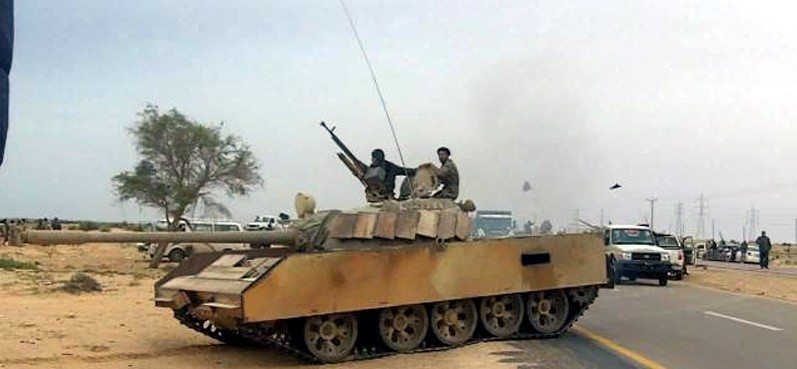France and Britain agreed to step up military pressure on Moamer Kadhafi’s regime after world powers meeting in Doha promised Libya’s rebels cash and the means to defend themselves.
French President Nicolas Sarkozy and British Prime Minister David Cameron agreed on stepped up military pressure at a working dinner in Paris ahead of a meeting of NATO foreign ministers in Berlin beginning Thursday, a source in the French presidency said.
“All means must be made available” in the fight against Kadhafi, the source said, amid efforts by London and Paris to step up pressure on their NATO allies to help defeat his regime.
The diplomatic moves came amid rising friction within the alliance over a NATO air campaign in Libya that has so far failed to change the balance of power on the ground in Libya.
US Secretary of State Hillary Clinton, who arrived in Berlin for the meetings Thursday and Friday, issued a statement denouncing what she said were continuing attacks on civilians by Kadhafi’s forces.
“In recent days, we have received disturbing reports of renewed atrocities conducted by Qadhafi’s forces,” she said.
Meanwhile in Tripoli, Libyan Deputy Foreign Minister Khaled Kaim on Wednesday charged that elements of the Lebanese group Hezbollah were fighting with the rebels in eastern Libya.
He said Qatar had sent military trainers to Libya and was supplying the rebels with French-made Milan anti-tank missiles.
Mahmud Jibril, who handles foreign policy for the rebels’ Transitional National Council, was expected in Washington to meet with senior State and Defense Department officials as well as with congressional leaders.
“These meetings will allow us to continue to have a better sense of the opposition and the TC and its vision for Libya,” State Department Mark Toner said.
In Doha, the international contact group on Libya decided after a daylong gathering to set up a “temporary financial mechanism” to aid the rebels seeking to oust Kadhafi.
It “affirmed that Kadhafi’s regime has lost all legitimacy and he should leave and allow the Libyan people to decide their future.”
While there was a consensus that Kadhafi must go, differences emerged over arming the rebels.
The rebel leadership said in a Tweet: “We?re discussing weapons deals with countries that officially recognised the council; we?ve been getting positive replies.”
The meeting’s final statement said “participants in the contact group agreed to continue to provide support to the opposition, including material support.”
Qatari Prime Minister Hamad bin Jassem al-Thani told reporters this refers to “humanitarian means, and also means of defence. And that means that the Libyan people should get the means that they need to defend themselves.”
But he seemed to acknowledge that this view was not universally held. He said “people gathered here have different interpretations,” while reiterating that “the first thing that the Libyan people need is self-defence.”
Italian Foreign Minister Franco Frattini said “either we make it possible for these people to defend themselves, or we withdraw from our obligation to support defending the population of Libya.”
The UN resolution “does not prohibit supplying arms … for self-defence,” Frattini said.
Meanwhile, British Foreign Secretary William Hague said Britain had been providing non-lethal equipment to the rebels, and would continue to do so.
Belgium expressed opposition to arming the rebels, while Germany insisted that there could be “no military solution.”
But Mahmud Shammam, a spokesman for the rebels, indicated that the arms issue does not require consensus. “If needed, we will request (arms) from countries on a bilateral basis.”
UN chief Ban Ki-moon urged the international community to “speak with one voice” on Libya, while warning that as many as 3.6 million people, or more than half of Libya’s population, could need humanitarian assistance.
French Foreign Minister Alain Juppe told a press conference after the meeting that the contact group was eyeing a conditional ceasefire in the conflict.
“We want to achieve a ceasefire but on condition it’s a real ceasefire under real control, not just a halt to firing,” he said. Any ceasefire must comply with UN resolutions and entail the withdrawal of Kadhafi’s forces from captured towns and a return to barracks.
The final statement said the parties “agreed to set up a temporary financial mechanism to act as a means for the Transitional National Council and international community to manage aid revenues and secure short-term financial needs.” It gave no figures.
Shammam said “we will not use this money at all to buy weapons; it will be used for the basic needs of the Libyan people.”
Speaking to AFP on Wednesday, rebel foreign relations chief Ali al-Essawi called for increased air strikes by NATO on Kadhafi’s tanks and missile sites.
“Civilians are not sufficiently protected,” he said.
Essawi also said rebels were willing to hold talks with “any defector” from Kadhafi’s regime, including former foreign minister Mussa Kussa, who Hague said was in Doha for contacts but not involved in the Doha meeting.
“We would welcome to speak to anybody who defects or wants to defect, to help them. We would speak to anybody who would give information to help the Libyans in this situation,” he said.
France said it will push NATO allies at a meeting on Thursday to contribute more warplanes to the bombing mission in Libya and speed up the air strikes.
Only six out of NATO’s 28 members are conducting air strikes, while French and British warplanes are carrying out half the missions, the official said.
Ban painted a bleak picture of the impact of the fighting in Libya, which erupted when Kadhafi’s forces began violently suppressing a popular uprising that began on February 15 against his four-decade iron-clad rule.
“Under our worst-case scenario, as many as 3.6 million people could eventually require humanitarian assistance” in Libya, which has a population of six million, Ban told delegates before the session went behind closed doors.
“The humanitarian situation continues to worsen,” he said.
“Approximately 490,000 people — almost half a million people — have left the country since the crisis began,” Ban said, quoting figures from the United Nations refugee agency UNHCR.











